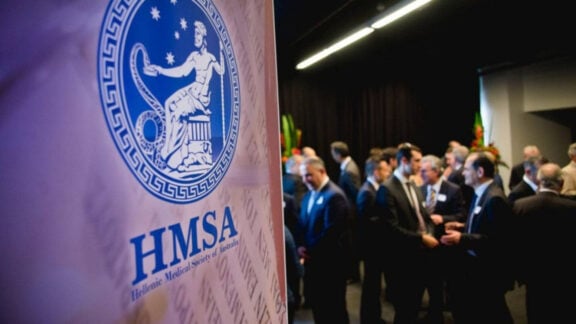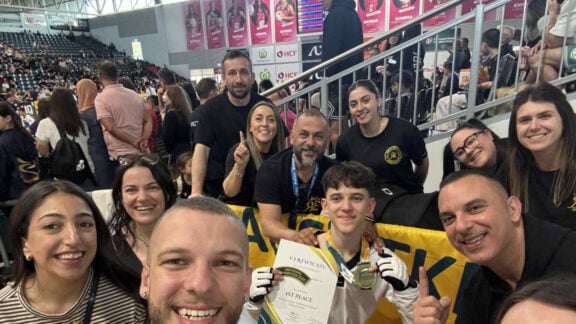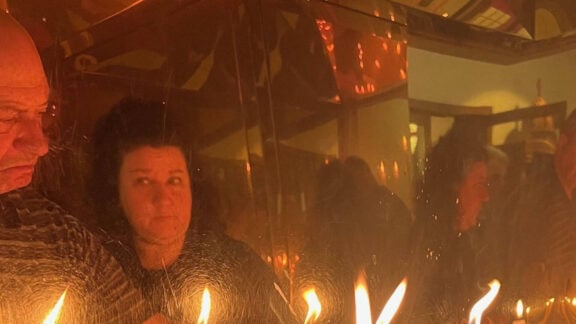“The word ‘theatre’ comes from the Greeks; it means the seeing place. It is the place people come to see the truth about life and the social situation.”
Legendary acting teacher Stella Alder’s quote perfectly sums up Georgia Zogalis’ idea to put on a trilogy of plays titled Brushstrokes of Life to raise awareness about the stigma and taboos surrounding people with disability.
Zogalis works for Settlement Services International (SSI) and is the manager of the FutureAbility project that aims to promote the National Disability Insurance Scheme (NDIS) to non-English speaking communities.
It is estimated that 20 per cent of NDIS packages nationally will be used by people from culturally and linguistically diverse (CALD) backgrounds. Since the full NDIS roll-out commenced in mid-2016, the national participation rate is only at 7.2 per cent (nine per cent in NSW).
Zogalis developed the idea and also helped write the scripts of the three plays that are currently being performed at the Hellenic Art Theatre group in Marrickville, Sydney.
After working with migrant communities in aged care and the mental health sectors for 30 years, it’s fair to say Zogalis understands the CALD community and the issues facing people with disability and their families.
“Shame and fear and stigma are attached to disability,” she told Neos Kosmos.
“People think that if you have a child with a disability that you are somehow not worthy, that it’s shameful. That it’s better to keep them at home and not let them out into the community, to not take them out to church, to social outings, or participate in activities because it can bring shame.
“But every community has a proportion of people with disability. It just happens in nature. Disability doesn’t discriminate across cultures. That’s how we have evolved.”
The rollout of the NDIS is the biggest social policy change in Australia’s history since Medicare was introduced in the 1970s and Zogalis believes communicating this change to migrant communities is vital.
“Traditionally CALD communities were missing out on disability services because they didn’t know where to go or how to navigate them,” she says.
“It is very important that we educate the CALD communities about the new NDIS, inform them that it is available and how they get to choose which services and support to buy to help them lead a more inclusive life. They don’t have to rely on fitting into the disability service system of the past.”
Zogalis says expressing awareness of the support provided by the NDIS through a play is a much more effective way of getting the message across than the usual methods.
“Theatre for some cultures has been the traditional way of storytelling,” she says.
“I know in my family, from [when I was] a little girl, my parents would take us to Greek theatre. Also, with theatre you can build in comedy and you can put in other messages that you can’t put into a 200-word pamphlet.
“You can actually tap into taboo subjects in theatre. So, we tackled a lot of ‘controversial’ issues, but in a light-hearted way. For example, we touched on the reliance upon siblings to do the caring, and on issues about stigma and shame around having a child with disability. About hiding them and being fearful of allowing them to go out. There were a lot of issues that we couldn’t put on paper, but we could tackle with laughter and song and jokes and attitudes through the plays.”
Brushstrokes of Life opened in Sydney on Friday 13 April in Sydney, and Zogalis says she was pleased with the opening night turnout.
“Our premiere played to a full house which was fantastic,” she enthuses.
“We have never really talked about disability in CALD communities; we haven’t actually said people with disability have the same rights as everyone else. And they have every right to participate fully in their community through employment, education, sport, and everything else the rest of us enjoy individually and collectively.
“In theatre that’s what we do – we’re having a dialogue about those issues. We are saying disability is nobody’s fault, but it happens and the NDIS can help you. Having support through this wonderful program makes it easier for the person with the disability, their family and everybody wins.”

The under-utilisation of the NDIS so far by CALD communities can also be attributed to how it is not being communicated to those communities in their own language Zogalis says.
“Using methods they are familiar with, such as theatre, was a major reason why it was aimed at the older Greek generation. These people need information in their language to get the message across,” she explains.
“In the Greek community there are issues around communication between the elderly and the younger generation – grandkids speak in English and yiayia speaks in Greek!”
Zogalis also revealed that besides the language barrier, elderly members of the CALD communities faced a number of issues relating to the NDIS.
“Working in this sector we see problems relating to discrimination, racism, and ageism,” she says.
“This disadvantage is by virtue of being a woman, elderly, a refugee or a new immigrant. That’s why these messages were tackled in the play; for elderly carers we tackled end of life issues as the main carer of an adult child with disability. Who is going to care for their 55-year-old daughter? Have they considered what’s going to happen when they go?”
Zogalis says some families are not aware that the NDIS is there to assist them and many people have incorrect information about what the changes that have come in actually mean.
“The NDIS money that comes to the person is in addition to the disability pension,” she says.
“Some people wrongly think they are going to lose their pension; the disability pension is for living expenses like rent and electricity. With the NDIS, the person with the disability gets the funds to pay for supports that are associated with their disability, for example personal care, home modifications, mobility aids, etc. We have this message in the plays.”

One of the plays Brushstrokes of Life tells the story of a grandmother that needs to look after a grandson who is on the autism spectrum. Zogalis says attitudes regarding children with special needs also need to change.
“People from CALD backgrounds understand and explain disability in different ways based on their cultural beliefs and practices,” she says.
“They might describe a kid with autism as zoiro (lively) when in fact the kid is on the spectrum. Early intervention is really important so they don’t miss out as that will stifle their progress and improvement later on in life. That’s why it’s also really important the way you deliver that message to people. You give them the reasons why it’s important to get a diagnosis so they can get help as early as possible.”
Zogalis hopes other states will follow NSW’s lead and spread the message surrounding people with disability in their community by using a variety of methods and mediums like theatre.
“It’s really important that people see disability as just another issue in the community,” she says.
“It’s nothing to be fearful and shameful about. People with a disability should have equal opportunities to participate in the community. The NDIS is here to help the person and their family to live a better and more productive life.”
‘Brushstrokes of Life’ is being staged at Hellenic Art Theatre (142 Addison Rd, Marrickville, NSW) now until 6 May (Fridays & Saturdays at 8.00 pm; Sundays 5.00 pm). To book, call 0413 989 007, (02) 9519 8104 or visit hellenicarttheatre.com.au









